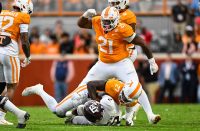One of the benefits of being a Top 15 team: pointing out weaknesses in victory! How have your conversations about the Pitt game started the last couple of days? Something like, “Great win…we’ve got some work to do!”? Me too! Josh Heupel’s Monday press conference began that way as well.
Given the Vols are now merely 48.5-point favorites against Akron this week…I’m not sure how much we’re going to learn between now and the Gators. So: to the past!
Where do the questions start with Tennessee? Specific to the Pitt game, I was most curious about the running backs: not even their lack of production as much as their lack of opportunity.
Jabari Small had 10 carries for 17 yards, Jaylen Wright nine for 47. That’s 19 carries for running backs in a game that included overtime. Seems like not a lot!
But if you go back through Josh Heupel’s now 15-game tenure at Tennessee, you find that this kind of performance seems opponent-specific.
Running Back Carries as a Percentage of Total Plays, 2021-22
| Year | Game | RB Carries | Total Plays | Pct. |
| 2021 | Georgia | 17 | 84 | 20.2% |
| 2022 | at Pitt | 19 | 77 | 24.7% |
| 2021 | at Alabama | 14 | 55 | 25.5% |
| 2021 | at Kentucky | 12 | 47 | 25.5% |
| 2021 | Pitt | 19 | 66 | 28.8% |
| 2021 | at Florida | 22 | 68 | 32.4% |
| 2021 | Ole Miss | 26 | 79 | 32.9% |
| 2021 | South Carolina | 28 | 72 | 38.9% |
| 2021 | vs Purdue | 43 | 105 | 41.0% |
| 2021 | Tennessee Tech | 34 | 79 | 43.0% |
| 2021 | South Alabama | 34 | 72 | 47.2% |
| 2022 | Ball State | 43 | 86 | 50.0% |
| 2021 | Vanderbilt | 30 | 60 | 50.0% |
| 2021 | at Missouri | 42 | 78 | 53.8% |
| 2021 | Bowling Green | 50 | 88 | 56.8% |
No surprise, you’ve got Georgia and Alabama near the top of the list, both in the talent department and in the playing-from-behind department. At Kentucky last year, the Vols only ran 47 total plays, making it easy for the percentages to get skewed.
But Pitt shows up both years as well.
So this is a question we’ll be curious to see the answer to in two weeks: did the Vols proactively choose to throw it more against what we perceived to be a good Pitt front, or will this group struggle to run the football against the non-Ball States of the world?
Last season the Vols were 34th nationally in yards per carry at 4.90. The 2.60 yards per carry Tennessee got at Pitt trails only Alabama and Georgia in Heupel’s offense at UT. But a big factor in those numbers is Hendon Hooker: both his productivity as a runner, and the high sack rate the Vols suffered last season.
At Pitt, Hooker was sacked on 6.67% of his passing attempts. That’s not great, but it’s an improvement over the 10.88% he went down on passes vs FBS foes last season. Those three sacks are included in the 15 rushing attempts Hooker was credited with Saturday, some/many of them escaping pressure leading to just 27 yards.
Hooker ran for 49 yards on nine carries when he came into the Pitt game last year. After that, it was fairly easy to see a pattern develop in 2021: when Hooker averaged at least three yards per carry, the Vols went 6-1 (Ole Miss being the loss). But in the other losses Hooker started:
- at Florida: 13 carries, 23 yards, 1.77 ypc
- at Alabama: 13 carries, 27 yards, 2.08 ypc
- Georgia: 17 carries, 7 yards, 0.41 ypc
- vs Purdue: 19 carries, 52 yards, 2.74 ypc
Get to the quarterback, and you beat Tennessee last year.
But this time, through some combination of proactive play-calling and getting sacked slightly less, the Vols still struggled to produce rushing yardage, but found less of their offensive fate tied to it.
Again, it’s gonna take two weeks to get an answer to this, at least. No guarantees we’re going to find more success against Alabama or Georgia; the Vols opened Saturday with only one RB carry in the first nine snaps and two in the first 13. Will Tennessee continue to attack through the air to help the running game find opportunities? Or was this something more specific to Pitt and/or really good run defenses?
And, of course, do the Gators qualify? Special teams miscues ruined Kentucky’s rushing stats in The Swamp, but Utah ran for 230 yards at 5.90 per carry.
I’ll be curious to see how often the Vols go to their backs against the Gators; I think that will tell us a lot about how this team views its own offensive efficiency going forward.




